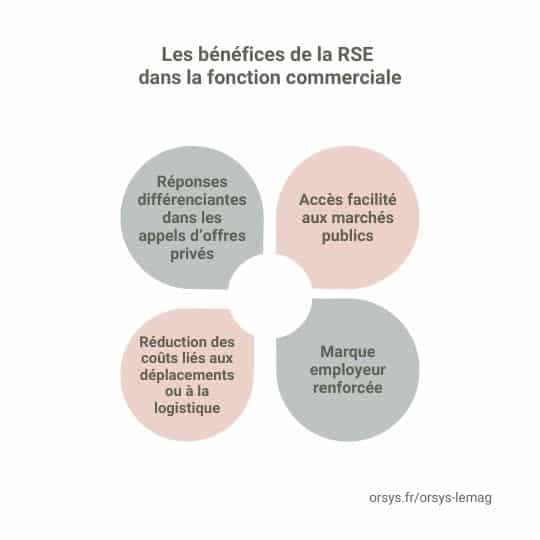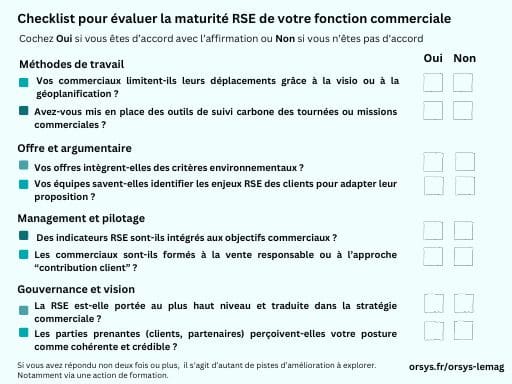Long confined to the spheres of production, purchasing and HR, corporate social responsibility (CSR) is now being extended to sales teams. Sober energy use, CSR criteria in calls for tender - particularly from the public sector -Increased stakeholder expectations, the rise of mission-driven companies... The sales function too must embrace sustainability. So what new levers can we activate to sell better and more responsibly? How can we reconcile performance, impact and consistency in our commercial practices? Bénédicte Serradeil, an expert in CSR support and decarbonising companies, looks at the challenges and best practices.

Definition of CSR
CSR refers to all the practices put in place by companies to integrate the principles of corporate social responsibility (CSR). social, environmental and ethical issues in their activities and their relations with stakeholders (customers, employees, suppliers, etc.).
In practical terms, this means acting in a more sustainable and responsible way, going beyond legal obligations, by reconciling economic performance, respect for the environment and social progress.
Gone are the days when sales performance was measured in terms of volumes sold and growth at all costs. Today, selling "better" is replacing "always more". It's a gentle but profound revolution that's shaking things up. This revolution is redefining the essence of the sales profession, based on usefulness, responsibility and consistency.
Integrating new working methods
The regulatory framework is increasingly prompting us to rethink our commercial practices, with a view to sobriety and transparency. The days when appointments were made at the other end of the region without question are long gone.
Today, regulations such as the Climate and Resilience Act (2021) encourage the reduction of travel and the promotion of more sustainable solutions. Similarly, the CSRD directive (Corporate Sustainability Reporting Directive), in force since 2024, requires large companies to report on their social and environmental impacts, directly influencing calls for tender and sales pitches. In addition, the European Directive on Responsible Public Procurement is encouraging buyers to include CSR criteria in their tenders. All these developments are profoundly transforming the sales profession.
In addition, the widespread use of remote selling (distance selling, by videoconference or telephone) has changed the way things are done. What was a short-term constraint has become structural best practice: first appointment by videoconference by default, remote customer follow-up, collaborative tools such as shared folders, Klaxoon, Mural, Miro, etc.
Today, more than 62 % of B-to-B salespeople say they prefer an initial contact by video (McKinsey study, 2023). This not only reduces the need to travel, but also saves 15 to 20 % of productive time (HubSpot study, 2022).
Some companies are also completely rethinking their sales routes: shared travelThis could include increased use of the train, geo-planning and even an assessment of the carbon relevance of each trip.
The commercial relationship becomes more agile, while reducing the carbon footprint.
Not only is it good for the planet, it also frees up time, energy and sometimes even... money!
Testimonial
Julien, sales engineer in an industrial ETI (B to B sector)
"Before, I used to drive over 50,000 km a year to see my customers, often for 45-minute appointments. It was exhausting, time-consuming and not always very efficient.
Over the last two years, we've completely overhauled our approach. The first contact is systematically made by video. This allows us to qualify the need quickly, sometimes involving several contacts on the customer side, and then decide whether the need is worth the trip.
As a result, I've reduced my journeys by 40 %, I'm spending more time on complex cases... and my customers find it runs more smoothly.
Frankly, I wouldn't go back. It's more consistent with our CSR approach, but also with my quality of life at work.
Adapting your commercial offering
Buyers - both public and private - are increasingly demanding consistency between their stated CSR commitments and the offers they make. In 2024, nearly 70 % of public tenders included significant CSR criteria (Observatoire des achats responsables).
Companies are adapting and rethinking their offer to include environmental and social criteria.
| Environmental criteria | Social criteria |
| Ecodesign of products | Manufacturing conditions |
| Reducing the carbon footprint | Origin of raw materials |
| Transparency of supply chains | Local employment, integration, diversity |
| Repairability, take-back, re-use | |
| Waste management |
A responsible offer has become a lever for commercial differentiation.
Example :
Decathlon, with the support of thereparability index designed by the French Environment and Energy Management Agency (ADEME), has developed its own grid for assessing the repairability of its products. For each category of item, a product is considered repairable if it meets several key criteria:
- technical documentation accessible to the user or repairer
- availability of spare parts
- easy to dismantle without damage
- a repair cost of less than 30 % of the purchase price
In this new context, the sales pitch is changing radically. The logic of "more and more" is out the window: it's time to focus on relevance, personalisation and, above all, consistency.
CSR also requires greater transparency, ethics and respect for customers.
It's no longer a question of simply selling a product or service, but of meet a need in line with the customer's CSR challenges. This requires a clear understanding of its objectives in terms of sobriety, impact and circularity, so as to be able to propose a truly tailor-made offer.
As a result, the playing field for salespeople is shifting from promotion to contribution. You have to know how to talk about utility, meaning, impact, life cycle analysis... If you talk too generically, if your promises are poorly spelled out, you're bound to be disqualified.
Rethinking incentives
Responsible selling also means manage differently. According to a BVA survey (2023), 82 % of salespeople would like their company to include objectives relating to meaning and impact when assessing their performance.
We are seeing the emergence of new management practices, more in line with CSR values and employee expectations.
Objectives are set jointly, with attention paid to their meaning and their contribution to the company's environmental and social challenges. This gives sales staff greater autonomy in organising their activities, encouraging greater responsibility and agility.
In the field, individual or collective initiatives by sales staff are valued by managers, whether they involve proposing an offer with less impact, optimising a journey or co-constructing a customer solution.
Performance reviews are becoming collaborative, incorporating qualitative criteria (loyalty, relevance of the offering, environmental impact of the sales cycle) and promoting a logic of cooperation rather than competition.
One of the major projects is therefore to redefine the commercial charterstraining in responsible selling, and reinventing recognition objectives and methodsaround new indicators:
- reduction in CO₂ emissions linked to travel
- customer loyalty or satisfaction
- ability to develop low-impact solutions
- inclusion of CSR criteria in the annual appraisals of sales staff
Example of a commercial charter :
Our commitments to a responsible commercial relationship
1. Transparency and sincerity
- Present the benefits of our offers honestly, particularly in terms of the environment
- Ban any misleading or approximate discourse (greenwashing...)
2. Sobriety in our practices
- Favour video meetings during the prospecting phase
- Limit high-impact travel (planes, long-distance cars) to what is strictly necessary
- Organise sales rounds according to criteria of proximity and carbon impact
3. Active listening and co-construction
- Adapting our proposals to the specific CSR challenges of our customers
- Proposing tailor-made solutions that integrate performance and positive impact
- Encourage eco-designed, repairable, recyclable or poolable products and services
4. Inclusion and accessibility
- Ensuring respectful and non-discriminatory commercial practices
- Ensure that our materials and interactions are understandable and accessible to everyone
5. Ongoing commitment
- Training our sales teams in environmental and social issues
- Integrating CSR indicators into sales performance assessment
- Involving sales staff in the company's CSR initiatives (workshops, local initiatives)
This charter is communicated to our customers and partners and is the subject of an individual commitment by each member of our sales force.
It's no longer just a question of rewarding top salespeople, but also those who know how to sell better, fairer, more sustainable.
Even our sales challenges are evolving, with festive events that are more sober and local, with a real CSR dimension.
Example 1: Sales targets extended beyond sales
In some industrial and service companies, sales managers are now part of the management team. qualitative indicators in team objectives:
- customer satisfaction
- environmental impact of sales (e.g. percentage of eco-designed products sold)
- number of offers co-constructed with customers around sustainable solutions
- participation in internal initiatives (CSR workshops, sobriety working groups, etc.)
Result: sales staff feel recognised for more than just financial performanceThis strengthens their commitment and support for the company's CSR initiatives.
Example 2: incentives revised to be more sober and more virtuous
Forget weekends in Dubai or expensive high-tech packages.
Some companies now offer more responsible rewards :
- ecotourism or solidarity holidays
- team challenges around an impact project (afforestation, restoration of local biodiversity, etc.)
- donations to associations chosen by the sales representatives themselves if targets are met
And to keep things friendly: in-house events less carbon but just as unifying (seminar accessible by train, local cuisine, outdoor activities, etc.).
Taking advantage of CSR governance
Obviously, this transformation requires investment: in time, training and tools.
Training
To raise your teams' awareness of CSR issues: Ecological transition and CSR
To find out how to incorporate a CSR approach into your business strategy: Implementing a CSR approach
Read also : CSR, an opportunity for change to benefit your company
In the medium term, the benefits are very real.
A well-implemented CSR policy becomes a powerful lever for commercial differentiation.

- By integrating a CSR policy, you can respond more effectively to the following challenges calls for tender where social and environmental criteria are becoming increasingly important, particularly in the public sector, but also among major private contractors.
- This opens the door to new markets impact offer, circular offer, associated consultancy services, etc.
Examples
Impact offer: a printer specialising in "zero plastic" printing and vegetable-based inks, targeting committed brands and eco-responsible events.
Circular offer: a public works company is developing the recovery and reuse of building site materials (doors, radiators, paving stones), sold at reduced prices to craftsmen and private individuals.
Associated consultancy services: a supplier of industrial equipment includes in its offer a free energy audit and recommendations for optimising the use of its machines.
- A CSR policy can generate operational savings in business practices: less travel, less waste, less stress for teams.
- It also strengthens thebrand image and the employer brandA company that advocates sobriety, consistency and commitment fosters more balanced relations with customers, more committed employees, greater confidence on the part of partners and talent... and, ultimately, more sustainable performance.

To sum up, what does CSR mean for a salesperson?
- Selling differently: products or services that are more sustainable, useful and consistent with customer expectations.
- Working differently: limiting unnecessary travel, encouraging cooperation, adopting a consultative approach.
- Stand out from the crowd: responding to demanding tenders, strengthening customer relations through shared values.
CSR doesn't hold back commercial performance, it steers it in the right direction.
The transformation is underway, but it is still uneven. The challenge remains huge These include changing mindsets without disengaging teams, demonstrating that commercial restraint can also be a source of differentiation... and integrating CSR into everyday life without making it an administrative burden.
But the pioneers are already paving the way. A more sober, more lucid and perhaps more desirable path. A sales function aligned with the challenges of its time.





